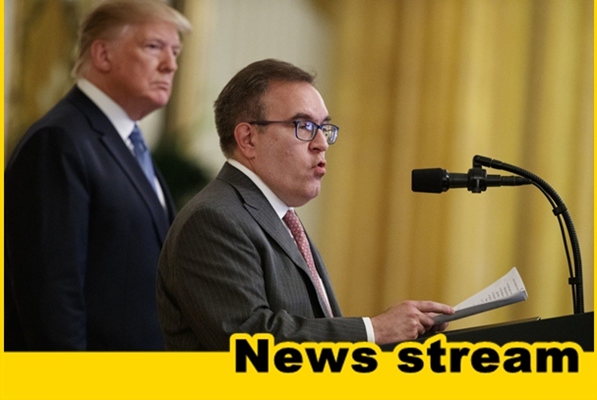
The Trump administration will seek to roll back rules limiting methane pollution from oil and gas production, gutting a regulation put in place under President Barack Obama that was designed to curb emissions of the powerful greenhouse gas.
The move is the latest by the Trump administration to eliminate rules designed to fight climate change — even as rising temperatures made July the hottest month on record, accelerated Arctic ice melting and intensified forest fires around the globe.
The new proposal released on Thursday by the Environmental Protection Agency is also notable in that it is opposed by many oil and gas producers that it is designed to help by easing requirements on leaks of methane, the main component of natural gas, from their oil and gas equipment.
Some companies have become increasingly wary of the administration’s deregulatory push, and some have requested EPA slow its efforts to ease rules governing power plants’ mercury pollution and the planned rollback of vehicle fuel efficiency standards.
But EPA defended the changes in methane rules as in line with President Trump’s call to reduce regulation, and projected they would reduce costs for oil and gas producers by around $10 million a year.
EPA’s acting air chief Anne Idsal fired back at critics who have argued that the monetary benefits to industry pale in comparison to methane’s impact on climate change and that low prices for natural gas have eroded the market incentives to plug leaks.
The rollback “seeks to stop burdensome and costly federal regulations which impact oil and natural gas industry and as a result add some pretty considerable costs to domestic energy production while providing minimal environmental benefit,” Idsal told reporters on a conference call Thursday. “Oil and gas are very valuable resources. Industry has every incentive to maximize revenues.”
Oil and gas industry groups praised the EPA proposal as a helping small companies that operate thousands of wells across the U.S., and they downplayed any divisions among members.
The American Petroleum Institute said its 600 member companies were united about rolling back the rule, which it said hurt smaller companies that did not have the funds to comply.
“We had a strong consensus all along,” API Vice President of Upstream and Industry Operations Erik Milito said in an interview. “Every company is situated differently … You have to make sure you’re not disproportionately impacting the small business community that has small wells.”
But the largest companies, such as Exxon Mobil, BP and Shell, which are seeking to position natural gas as a cleaner, climate-friendly fuel, said they wanted to keep the existing rule in place.
“Last year we announced our support for the direct regulation of methane emissions for new and existing oil and gas facilities,” Exxon Mobil spokesperson Scott Silvestri said. “That hasn’t changed. We will continue to urge the EPA to retain the main features of the existing methane rule.”
BP America Chairman and President Susan Dio agreed, saying EPA should „directly regulate methane emissions from new and existing sources,” and adding that existing rule „is the most effective way to protect the environment and maximize the benefits of natural gas.”
For those companies, which have already launched major efforts to eliminate methane leaks, allowing more pollution undermines the case they are making that natural gas should be part of the U.S. effort to address climate change.
“At at time when the oil and gas industry is suffering severe reputation problems, this could be the final blow to the viability of natural gas having any role in the transition to a clean energy economy,” said Matt Watson, vice president of energy programs at Environmental Defense Fund, which works with companies in the industry to bring their methane emissions down.
“You have these companies that are looking out in the future and wondering what their business model is going to be, and they understand the viability of their product is in question and they’re in trouble,” he added.
The proposal would effectively undo a rule issued by the Obama administration in 2016 that directly regulated methane from newly built oil and gas wells and other production facilities. Methane is a particularly potent greenhouse gas, one that the industry has sometimes struggled to contain in the pipelines and well sites that have popped up during the shale gas boom.
EPA Administrator Andrew Wheeler previewed Thursday’s action in May.
EPA had previously set rules for well emissions of volatile organic compounds, a class of hazardous pollutant whose pollution controls also helped curb methane emissions. But environmentalists said direct regulation of methane was necessary to effectively control a leading source of greenhouse gases, particularly as U.S. natural gas production skyrocketed over the past decade.
The existing 2016 rule’s methane requirements applied only to newly built wells, but would have eventually required EPA to regulate the hundreds of thousands of existing wells already drilled around the U.S. The Obama administration had taken early steps toward such a regulation, but former Administrator Scott Pruitt halted that work soon after arriving at EPA in 2017.
The EPA’s stance has split the oil and gas industry. Smaller companies complained that the rules impaired their bottom lines. The American Petroleum Institute, a trade association representing the industry, formed a voluntary group of member companies to share best practices to reduce their emissions.
Executives from Shell, BP and Equinor had asked the administration to forgo the rollback, both publicly and in meetings with White House officials. That included most recently talks with the Office of Management and Budget, according to an industry source.
Shell’s top executive in the U.S., Gretchen Watkins, said the company would continue efforts to bring its global methane emissions intensity below 0.2 percent by 2025 and cut its net carbon footprint by half by 2050.
“Despite the Administration’s proposal to no longer regulate methane, Shell’s U.S. assets will continue to contribute to that global target,” Gretchen said in a statement to POLITICO. “While the law may change in this instance, our environmental commitments will stand.”
Earthjustice attorney Tim Ballo said the environmental group will sue EPA to keep the standards in place once the change is finalized, likely next year.
“The Trump administration is once again putting industry interests over people and public health by gutting these common-sense emission standards,” he said. “The rollback would only further exacerbate a climate crisis that is already near a point of no return. We cannot afford to go back.”
In 2017, oil and gas sector methane emissions topped 200 million tons of CO2-equivalent, the same as running 52 coal power plants for a year, according to EPA data.
The oil and gas industry has touted its voluntary efforts to reduce methane pollution. Between 1990 and 2017, natural gas and oil producers reduced their emissions by 13.5 percent while increasing production by more than 50 percent, according to EPA and Energy Information Administration data.
But methane remains a potent driver of near-term warming. And when released via oil and gas production, it is often accompanied by volatile organic compounds, a group of carcinogens and neurotoxins that also help form smog.
The Interior Department has also moved to lift methane restrictions on the oil and gas sector.
Interior already repealed its own „venting and flaring“ rule that required oil and gas producers on public lands to capture more of their methane rather than allow it to leak or burn it off in the atmosphere. That rule would have had a more limited impact since it only covered wells on federal lands, while EPA’s rule also applied to new wells on private lands.
By ALEX GUILLÉN and BEN LEFEBVRE
Source: politico.com
See more here: news365.stream





